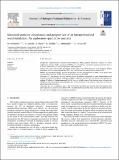Files in this item
Simulated patients' experiences and perspectives of an interprofessional ward simulation : an exploratory qualitative analysis
Item metadata
| dc.contributor.author | McKinley, M. | |
| dc.contributor.author | Arnold, A. | |
| dc.contributor.author | Burns, I. | |
| dc.contributor.author | Geddes, H. | |
| dc.contributor.author | McDonald, L. | |
| dc.contributor.author | O'Carroll, V. | |
| dc.date.accessioned | 2022-05-12T15:30:22Z | |
| dc.date.available | 2022-05-12T15:30:22Z | |
| dc.date.issued | 2022-09 | |
| dc.identifier | 279261771 | |
| dc.identifier | 31374f3b-6409-4aea-976f-23265ebdb7b9 | |
| dc.identifier | 85129945820 | |
| dc.identifier.citation | McKinley , M , Arnold , A , Burns , I , Geddes , H , McDonald , L & O'Carroll , V 2022 , ' Simulated patients' experiences and perspectives of an interprofessional ward simulation : an exploratory qualitative analysis ' , Journal of Interprofessional Education & Practice , vol. 28 , 100522 . https://doi.org/10.1016/j.xjep.2022.100522 | en |
| dc.identifier.issn | 2405-4526 | |
| dc.identifier.other | Bibtex: MCKINLEY2022100522 | |
| dc.identifier.other | ORCID: /0000-0001-5777-104X/work/112333106 | |
| dc.identifier.other | ORCID: /0000-0002-3044-8223/work/112333688 | |
| dc.identifier.uri | https://hdl.handle.net/10023/25357 | |
| dc.description | Small grant awarded by The Association for Study of Medical Education (ASME). | en |
| dc.description.abstract | Background Interprofessional simulation-based education (IPSE) prepares healthcare students for future collaborative practice. Whilst experiences of IPSE have previously been reported by students and faculty, there is a limited understanding of simulated patients’ (SPs) experience. Purpose This study explored SPs’ perceptions of the quality of an interprofessional ward simulation (IPWS); experiences of the interprofessional care (IPC) they received, and their perceptions of effective IPC. Method Undergraduate nursing, medical and pharmacy students participated in an IPWS. Focus groups were used to collect data from 27 SPs following their participation in the IPWS. Discussion IPC was perceived to vary between groups of students. Recognition of roles, responsibilities and boundaries to prevent overlap of workload and improve efficiency of teamwork were perceived as important for making IPC effective. Findings suggested that SPs may not be fully aware of the changing scope of practice in healthcare. SPs reported that they would have liked more involvement in the creation of their role and how this played out in the simulation. Conclusion SPs’ play an important role in IPSE in healthcare education and recognise that understanding roles and responsibilities contributes to effective IPC. An additional finding of this study was that the public may not be aware of the changing scope of professional practice. | |
| dc.format.extent | 5 | |
| dc.format.extent | 408727 | |
| dc.language.iso | eng | |
| dc.relation.ispartof | Journal of Interprofessional Education & Practice | en |
| dc.subject | Simulation | en |
| dc.subject | Patients | en |
| dc.subject | Interprofessional | en |
| dc.subject | Undergraduate | en |
| dc.subject | LB2300 Higher Education | en |
| dc.subject | R Medicine | en |
| dc.subject | E-NDAS | en |
| dc.subject.lcc | LB2300 | en |
| dc.subject.lcc | R | en |
| dc.title | Simulated patients' experiences and perspectives of an interprofessional ward simulation : an exploratory qualitative analysis | en |
| dc.type | Journal article | en |
| dc.contributor.institution | University of St Andrews. Education Division | en |
| dc.contributor.institution | University of St Andrews. School of Medicine | en |
| dc.contributor.institution | University of St Andrews. Centre for Higher Education Research | en |
| dc.contributor.institution | University of St Andrews. Population and Behavioural Science Division | en |
| dc.identifier.doi | 10.1016/j.xjep.2022.100522 | |
| dc.description.status | Peer reviewed | en |
This item appears in the following Collection(s)
Items in the St Andrews Research Repository are protected by copyright, with all rights reserved, unless otherwise indicated.

